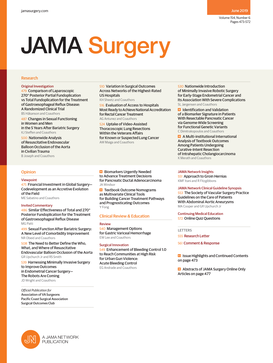肝癌分子检测与靶向治疗
IF 14.9
1区 医学
Q1 SURGERY
引用次数: 0
摘要
重要意义:肝胆癌具有异质性和分子复杂性。新一代测序(NGS)的最新进展增强了对其分子景观的理解,并使基于生物标志物的基因和免疫靶向治疗得以部署。本文综述了分子检测和靶向治疗在这些恶性肿瘤中的作用。观察肝胆癌患者预后较差。精确肿瘤学研究表明,虽然许多常见的分子改变目前在肝细胞癌(HCC)中是不可靶向的,但大量可操作的改变是胆道癌(btc)的特征,目前有几种治疗方法已获得美国食品和药物管理局的批准。临床越来越多地采用免疫疗法治疗HCC和btc,无论是单独治疗还是联合细胞毒性化疗。此外,多种实体癌肿瘤不确定疗法已被批准(larotrectinib、entrectinib和repotrectinib用于NTRK融合;自泊替尼用于RET融合;达非尼联合曲美替尼治疗BRAF V600E突变;dostarlimumab或pembrolizumab用于高微卫星不稳定性的肿瘤,而pembrolizumab用于肿瘤突变负担≥10个突变/megabase),强调了NGS和ERBB2(以前的HER2)免疫组织化学(IHC)的需求(最近批准了实体组织不确定的deruxtecan曲妥珠单抗用于ERBB2阳性[IHC 3+]癌症)。使用与肿瘤分子特征相匹配的定制药物组合的N-of-1临床试验已经产生了令人鼓舞的结果,并为未来的临床试验设计提供了一个有希望的框架。结论及相关性分子检测、基因和免疫靶向治疗正在改变肝癌治疗。肿瘤不可知论和N-of-1临床试验挑战了传统的临床试验范式,为这些侵袭性癌症患者的真正个性化肿瘤学提供了基础。需要进一步的工作来确定如何利用这些新方法来管理可手术的疾病。本文章由计算机程序翻译,如有差异,请以英文原文为准。
Molecular Testing and Targeted Therapies in Hepatobiliary Cancers
ImportanceHepatobiliary cancers are heterogeneous and molecularly complex. Recent advances in next-generation sequencing (NGS) have enhanced the understanding of their molecular landscape and enabled deployment of biomarker-based gene- and immune-targeted therapies. This review examines the role of molecular testing and targeted therapies in these malignant neoplasms.ObservationsPatients with hepatobiliary cancers have poor outcomes. Precision oncology studies have shown that while many common molecular alterations are not currently targetable in hepatocellular carcinoma (HCC), a large number of actionable alterations characterize biliary tract cancers (BTCs), with several therapies now approved by the US Food and Drug Administration. Immunotherapy is increasingly adopted in clinical practice, either as monotherapy or combined with cytotoxic chemotherapy, for both HCC and BTCs. Moreover, multiple solid cancer tumor-agnostic therapies are approved (larotrectinib, entrectinib, and repotrectinib for NTRK fusions; selpercatinib for RET fusions; dabrafenib and trametinib combination for BRAF V600E mutations; dostarlimab or pembrolizumab for tumors with high microsatellite instability and pembrolizumab for tumor mutation burden ≥10 mutations/megabase), highlighting the need for NGS as well as ERBB2 (formerly HER2) immunohistochemistry (IHC) (with the recent approval of solid tissue–agnostic deruxtecan trastuzumab for ERBB2-positive [IHC 3+] cancer) across cancers. N-of-1 clinical trials using customized drug combinations matched to the tumor’s molecular profile have yielded encouraging results and provide a promising framework for future clinical trial design.Conclusions and RelevanceMolecular testing and gene- and immune-targeted therapies are transforming hepatobiliary cancer treatment. Tumor-agnostic and N-of-1 clinical trials have challenged traditional clinical trial paradigms and provide the foundation for truly personalized oncology for patients with these aggressive cancers. Further work is needed to determine how to leverage these novel approaches into the management of operable disease.
求助全文
通过发布文献求助,成功后即可免费获取论文全文。
去求助
来源期刊

JAMA surgery
SURGERY-
CiteScore
20.80
自引率
3.60%
发文量
400
期刊介绍:
JAMA Surgery, an international peer-reviewed journal established in 1920, is the official publication of the Association of VA Surgeons, the Pacific Coast Surgical Association, and the Surgical Outcomes Club.It is a proud member of the JAMA Network, a consortium of peer-reviewed general medical and specialty publications.
 求助内容:
求助内容: 应助结果提醒方式:
应助结果提醒方式:


